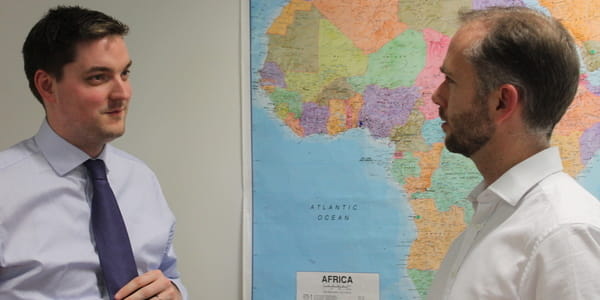A Day in the Life... of a Regional Security Operations Manager
Published: April 2016
HOTLINE (HL) SPEAKS TO INTERNATIONAL SOS' JAMES WOOD ABOUT WHAT IT TAKES TO BE A REGIONAL SECURITY OPERATIONS MANAGER.
James is part of the International SOS and Control Risks Europe Security Team, he is based in London.
HL: Tell us about your job.
I oversee the operational support we provide to our clients. Ours is a wide and diverse area, covering the whole of Europe, Central Asia and Northwest Africa. Many different challenges, such as protests, a lost passport or stolen luggage, or crime and terrorism, can and do arise there.
There are three key elements to our work: assessment, advice and assistance. We are constantly assessing the current and potential impact of developing situations and events across the region and evaluating information from multiple sources. We then use those assessments to provide operational advice for our clients to help them make decisions.
Most advice is given pre-departure to help organisations and their travellers understand and prepare for potential risks. We also help anyone involved in security incidents while travelling,including evacuating them.
HL: Don't governments advise on whether it is safe to travel?
Yes some do, but we look at the potential risk from the business traveller’s perspective and look to enable the safe continuity of business travel where we can.
An example of this is the attacks in Paris in January and November 2015, and subsequent threat level increases in Belgium. Based on our objective and clear assessment of the situation and the ongoing threat, we were able to provide practical advice to our clients. This meant we could advise them that it remained broadly safe to travel to Paris and to Brussels. We were also able to forewarn clients about the increased security presence and the tense atmosphere there, as well as assist in planning for events in the region.
Our advice is based on the wealth of information we have access to and our ability to synthesise this information into a balanced, independent and objective assessment based on the reality on the ground. We might say it is safe for an experienced corporate executive to go to a business district. But we might advise a lone student in the same city against visiting certain areas.
HL: What is a typical day for you?
We are a 24/7 operation so first of all the team gets up to speed on events and cases linking with our experts around the world. What has happened overnight?
Is anything predicted to happen? I oversee the thousands of calls we get from clients, how these are handled, and act as an escalation point.
When we are not dealing with an incident we work behind the scenes. That means ensuring we have the processes in place to deal with nearly all situations. We constantly reassess all unfolding events and reshape our advice to clients. Then, as the day ends, we review where we are. What needs to be passed to the night team? What are our priorities tomorrow?
HL: What kind of background do people typically have in this role?
Our specialists have extensive experience living and working in their regions, including in some of the most challenging security environments. Backgrounds are diverse, including military intelligence, research, police, aviation, non-governmental organisations, journalism, crisis management and commercial security. Most of my colleagues hold Master’s Degrees in relevant fields like international relations or security studies. Our security team represent over 18 nationalities and combined speak 24 languages.
HL: What do you do to relax when work is over?
I have a busy home life with a very active two-year old daughter. However, it’s important for me to spend time with family and friends and to fully recharge away from the office. I try to exercise when I can but this seems to be a harder pursuit than in previous years.
HL: Do you have much contact with clients?
I also visit clients for more in-depth discussions, as a subject matter expert. As well as being always ready to respond, we offer our clients proactive support. We like to keep them involved in our planning and preparation processes.









